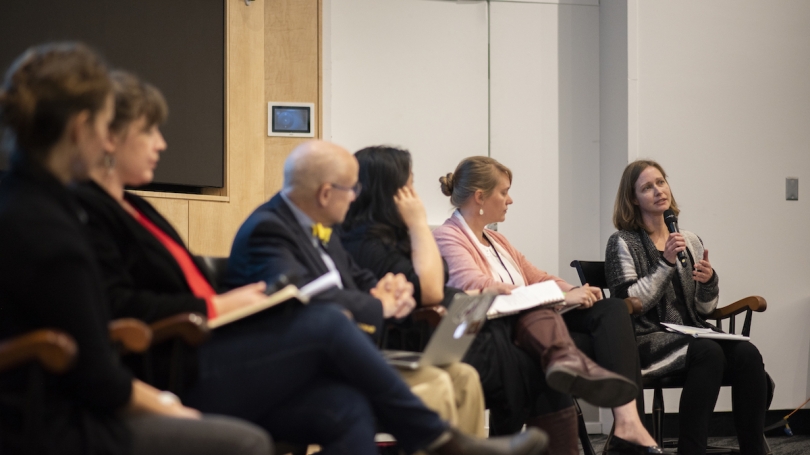

Anthropology scholars and energy justice advocates Maron Greenleaf, Sarah Kelly, and Elizabeth Carpenter-Song illuminate the local implications of rising energy costs, and how regular citizens can help.
On Tuesday, Oct. 11, Dartmouth's Energy Justice Clinic hosted a panel discussion on energy and equity in the Upper Valley.
Co-hosted by clinic co-directors Maron Greenleaf, an assistant professor of anthropology and faculty affiliate of the Ecology, Evolution, Environment, and Society Program, and Sarah Kelly, a postdoctoral researcher affiliated with the Arthur L. Irving Institute for Energy and Society and the Department of Geography, the discussion featured Elizabeth Carpenter-Song, a research associate professor of anthropology, as well as New Hampshire Consumer Advocate Don Kreis; Angela Zhang '12 from LISTEN Community Services; and Anna Guenther '08 of Vital Communities.
energyjustice2.png

The group discussed rising electricity, fuel, housing, and transportation prices from the perspective of energy justice, which seeks to promote socially just transitions away from fossil fuels.
Greenleaf and Kelly founded the Energy Justice Clinic in 2021, with support from the Irving Institute and the Center for Social Impact. Among its many projects, the clinic collaborates with the Town of Hanover and the Community Power Coalition of New Hampshire in supporting its community power initiative, which facilitates the collective purchase of renewable power; and works with COVER Home Repair on issues of energy insecurity.
The panel discussion explored important questions about the local implications of rising energy costs, and how nonprofit organizations, government agencies, and Upper Valley residents can help.
Here, Greenleaf, Kelly, and Carpenter-Song collaborated on responses to some of the topics that were raised.
How do the rising prices of electricity, fuel, and transportation disproportionately affect marginalized people in the area, especially ahead of winter?
The rising prices are exacerbating the pressures that income-precarious people already feel from the housing crisis, inflation, and other pressures for people's health and wellbeing. Nonprofit organizations that our students learn with, like COVER Home Repair, LISTEN Community Services, and Vital Communities, have taught us that there is a growing concern that people in these communities have and will continue to have difficulty paying for their energy needs. The COVID-related funding of the Emergency Rental Assistance Program has been very helpful for many families, but funding is expected to dry up this winter. This will affect a lot of people who have used these funds to handle these growing economic pressures.
At the same time, energy prices are rising significantly, with the price of electricity doubling for many this year, and the price of natural gas and oil for heating homes also rising significantly. This winter there is a real need for more economic support for income-precarious people to keep their homes warm and bills paid. Finally, social service colleagues point out that utility cut-offs due to growing debts are a critical point leading to people losing their housing.
How is energy insecurity experienced differently in the rural context of the Upper Valley?
Northern New England is experiencing energy insecurity acutely due to an old and energy-inefficient housing stock, and a dependence on oil and natural gas for heating. Being in rural places, people have a lack of access to public transport and often internet and computer access to apply for public assistance. They also have difficulty accessing grocery stores, doctors, work, and other needs due to living farther away from these places and needing to take public transportation or pay more for gasoline to get from place to place.
How do you see energy insecurity intersecting with the mental health and homelessness issues in our community?
There are several ways in which energy insecurity intersects with issues related to mental health and housing/homelessness in our communities. The lack of affordable housing in our region places individuals at risk of living in substandard conditions—older, dilapidated structures and energy-inefficient dwellings—that exacerbate energy insecurity. The high costs of housing in the Upper Valley leaves individuals and families with fewer resources to pay for other basic necessities, including their energy needs.
In addition, long travel distances across a large geographic area to major employers and hubs of commerce in our rural region create a reliance on cars. Struggling to meet basic needs and concerns about rising costs, in turn, contribute to high stress for many community members. Moving forward, there is a crucial need to link housing to health policy in our communities and to promote smart, equitable growth closer to town and village centers to meet the large and growing demand for housing in the region.
How are nonprofits and local government policies addressing energy insecurity in the Upper Valley?
There are coordinated efforts for energy weatherization for income-precarious people among nonprofits and local municipal governments. Organizations like COVER provide weatherization for people who have difficulty accessing these services, for example, those who live in mobile home parks. LISTEN provides a yearly stipend for fuel support (although it is unable to fully address the need with rising oil and propane costs), and local towns and churches also provide support. Vital Communities helps to coordinate services in a number of ways, including their energy help webpage.
Finally, Tri-County CAP services are also go-to places for local, regional, and statewide assistance programs. Some programs are difficult for renters to access (since they are designed for homeowners); this is a critical issue since these folks are often most income-precarious.
What can regular citizens do to help?
Donate to the nonprofits like those we mention above that offer weatherization and fuel assistance programs. Participate in weatherization volunteer work for your local towns and nonprofits. Support energy policymaking that fosters energy efficiency and socially just transitions to renewable energy. And get involved with housing equity issues.